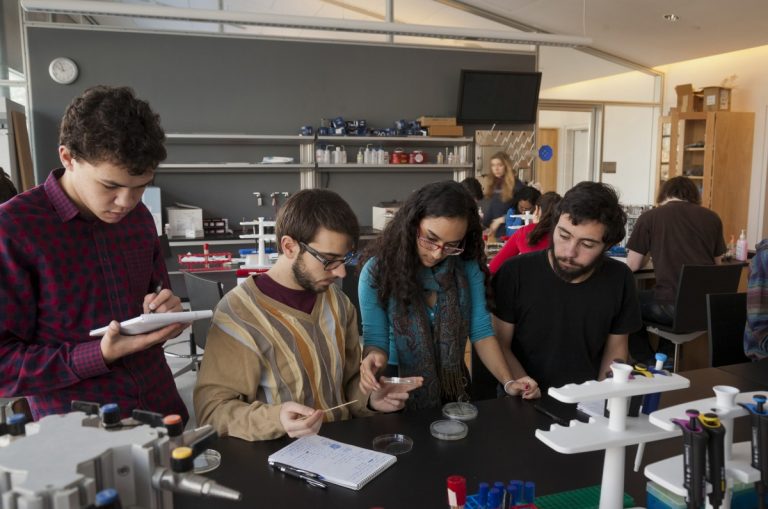
Liberal Arts cover the most fundamental subjects about our existence and society. An education in these areas prepares you for anything life might throw.
One of the hardest decisions you’ll ever make is which subject you want to pursue at university. Do you choose a subject that will get you a top city job, such as economics? Or do you choose a subject, like philosophy, that will give you a deep understanding of human existence?
Whilst this decision has always been tough, for millennials the stakes are even higher. Global relationships have never been more tenuous, and the emergence of Artificial Intelligence has even the most qualified graduates quaking in their boots. There really is no telling what the future economy looks like.
So, with times as uncertain as these, how can you invest in your future when no one knows what the future holds?
With a Liberal Arts degree, you can embrace a broad scope of interesting subjects without having to limit yourself to a single focus. In one class you could be learning about tectonic plate movement in your Geography module, and the next you could be analysing Marx’s theory of capitalism in Modern English Literature.

“I’d always wanted to go to university, but once the time came where I had to pick what subject I wanted to study, I was completely lost,” said Lauren McDermott, a current Liberal Arts student.
“Liberal Arts meant that I could continue studying the things I enjoyed, as well as try other subjects that I didn’t want to commit my entire course to.”
Although Liberal Arts degrees have proved their worth, they were first developed in Ancient Greece. In these times, an educated person was considered to be someone who was virtuous, knowledgeable and highly articulate. The best way to develop these qualities was to offer a broad education in grammar, rhetoric and logic.
In medieval times, the Liberal Arts were extended to include arithmetic, geometry, music and astronomy, and the modern day has seen its scope widen further to often include social and natural sciences, as well.
As a student of Liberal Arts, you will have the unique opportunity to engage your mind with an incredibly diverse intellectual programme. Rather than graduating into a niche area of expertise, you will have the flexibility to embrace our ever-changing world thanks to your wide-ranging knowledge.
This means that you will never be forced into a job because it’s the only thing you’re qualified to do. Instead, you will be met with an almost unlimited choice on which area to enter upon graduation.
It’s no secret that millennials are entering one of the toughest job markets the modern economy has seen. In uncertain times like these, pursuing a degree that provides an understanding in a range of fields could not be wiser.
By doing this, you are not only bettering yourself through cultivating a deeper understanding of our world, you are also developing the flexible expertise that you can apply to whichever industries might flourish in the future.
If you want to study a Liberal Arts degree and open your mind to a whole scope of knowledge, these universities are worth considering…
BARD COLLEGE

Bard College has an extensive global reach with 17 percent of students hailing from global roots, in addition to having students from almost all 50 states and Puerto Rico. Internship and academic experiences extend into neighbouring New York City, with its Global and International Studies program, which includes a semester of intensive study combined with some of the most coveted company placements in NYC.
In addition to the central campus’ research facilities in Biology, Chemistry and Environmental and Urban Studies, the Bard-Rockefeller University Semester in Science gives pre-med and other natural science students access to additional research facilities and faculty at Rockefeller University in central Manhattan.
Students interested in economics and finance have access to advanced statistics and software for working in the real-world business climate. To this end, over 90 percent of students are employed within six months of graduation in a range of notable organizations, such as Goldman Sachs, New York Magazine and Microsoft, or continue their education through prestigious graduate programs: Johns Hopkins, Harvard Law, London School of Economics; making it clear why Bard College was in Forbes’ Top 15 Schools for Return on Investment in the US.
ST JOHN’S COLLEGE
Founded in 1696, St John’s College offers students an education that steeped in history. Over this time, the college has refined their curriculum to offer students the best possible intellectual development.
Based on two campuses, students can enjoy the flexibility to study either in Annapolis, Maryland or Santa Fe, New Mexico. This offers students a comprehensive perspective, as they are not limited to living on the same campus with the same people for their entire degree.
Undergraduates can gain a world-class Liberal Arts degree on the four-year humanities, sciences, and arts curriculum. The programme includes an education in literature and philosophy, foreign languages, laboratory science, mathematics and investigative music. Graduate programmes also include Master of Arts in Liberal Arts and Master of Arts in Eastern Classics.
Over 25 nationalities are represented in St John’s College’s student body, meaning that there is a diverse international community. And, with the resident campus dog, you’ve always got a friend on hand if homesickness strikes!

POMONA COLLEGE
“They only are loyal to this college who, departing, bear their added riches in trust for mankind.” This is the trademark philosophy of Pomona College. Students can expect to receive not only an education at Pomona College, but also a new way of life.
With 94 percent of students living on campus for all four years of their degree, the college prides itself on the institution’s familial feel. This residential culture creates a strong sense of community on campus, even though there are people from over 63 countries living together.
“Conversations carry on far beyond the classroom, as students learn to think critically, communicate effectively and reach beyond barriers. And our friendly, spacious campus—where nearly all students live—is constantly alive with events,” the instituton notes.
The college offers over 45 majors in the arts, humanities, social and natural sciences, ranging from Astronomy all the way to Romance Languages & Literatures, so whatever your academic musings there is a programme to suit you.
GRINNELL COLLEGE
Nestled in the heart of Iowa, the town of Grinnell defies all stereotypes of the quiet US state. Studying here places you in one America’s coolest student towns, thanks to the multitude of independent restaurants and shops, the beautiful parks and bike trails, and the range of students that frequent the town.
At Grinnell College, emphasis is put on discovery, growth and engagement. The college recognises that the value of a Liberal Arts education greatly surpasses a traditional degree, and instead allows for deep personal development and awareness of the world.
Students benefit from a 9:1 student-to-staff ratio, meaning a close academic community is formed. This prepares students for a fulfilling intellectual career after graduating from the college, as they are able to form connections within the academic circle.
“Writing professionally once seemed as wild and abstract a concept as fire eating or playing basketball in the NBA—it sounded great, but I’d never met anyone who had actually done it. Next year I will be attending the University of Iowa’s MFA program in nonfiction. It’s an incredible opportunity, one that I’d never even have entertained without the support of the English department,” says Emily Mester, a graduate from 2014.

WASHINGTON AND LEE UNIVERSITY
At the heart of an education from Washington and Lee University is the goal to produce students who think critically, humanely and civilly. Not only does this university promise intellectual rigor, it also values self-understanding and life-long learning.
Washington and Lee University understands the changing needs of society, and with this recognises the changing necessity of education.
“Washington and Lee prepares its students to meet this daunting set of challenges through programs that educate and nurture strong leaders, visionary thinkers, compassionate citizens and ethical decision makers,” the website notes.
The university boasts three undergraduate centres: The College is the home of the Liberal Arts programme where humanities and social sciences are taught, The Williams School of Commerce, Economics, and Politics offers degree in Business Administration, for example, while The School of Law creates the next generation of legal leaders.
*Some of the institutions featured in this article are commercial partners of Study International
Liked this? Then you’ll love these…
Experience the unique learning culture at Bard College
St. John’s College: How the nation’s third-oldest school became a pioneer of modern liberal arts







